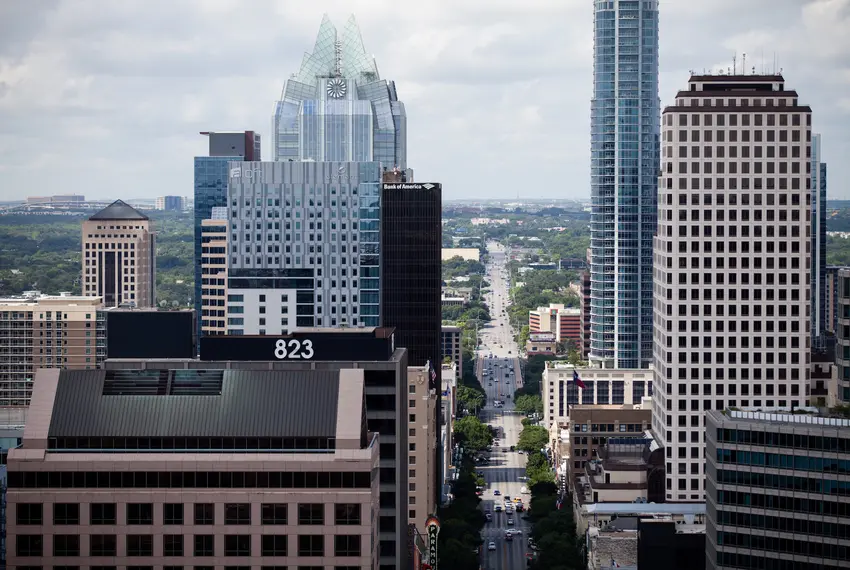CALL US TODAY: 775 415 - KIRK (5475)

To fight climate change and housing shortage, Austin becomes largest U.S. city to drop parking-spot requirements
Austin on Thursday became the largest city in the country to stop requiring new developments to have a set amount of parking — a move aimed at both fighting climate change and spurring more housing construction amid the city’s affordability crisis.
The Austin City Council voted 8-2 Thursday to wipe out minimum parking requirements for virtually every kind of property citywide. That includes single-family homes, apartment buildings, offices and shopping malls.
Housing advocates, developers and climate activists across the country have increasingly targeted such rules. They say parking requirements — often referred to as “parking minimums” — drive up housing costs while enabling dependency on cars, a major source of carbon emissions.
“I think that it's hard for reasonable people to really defend those mandates anymore,” said Tony Jordan, co-founder of Parking Reform Network.
Major cities have scaled back those requirements in recent years while others like Portland and Minneapolis have gotten rid of them altogether. San Jose, which has only a few thousand fewer residents than Austin, did away with the requirements last year.
Austin City Council Member Zohaib “Zo” Qadri, the proposal’s author, said keeping those requirements makes no sense as the city faces an affordability crisis and pumps billions of dollars into expanding public transit.
“It gobbles up scarce land. It adds burdensome costs to developments that get passed on to renters and buyers. It makes it harder for small businesses to get off the ground. And it harms walkability and actively works against our public investments in transit, bike lanes, trails and sidewalks,” Qadri said Thursday.
Getting rid of the requirements has its detractors. Neighborhood groups opposed to such reforms tend to worry that parking will spill over onto neighboring streets and clog traffic.
“Although I think that our existing parking requirements do need reform and there are many scenarios where I would relax or eliminate parking requirements, this universal elimination of requirements is a step beyond what I consider to be prudent,” said City Council Member Alison Alter, who voted against the measure. “I'm concerned that there will be unintended consequences in scenarios that create real problems for navigating areas where residential uses abut commercial uses, particularly in areas that have older, narrow streets.”
Getting rid of the requirements doesn’t mean the city is abolishing parking altogether, Qadri said. Developers still can decide how much parking they need, he said. And the city will still require properties to comply with federal law and build accessible parking spaces for people living with disabilities.
“If we truly want to achieve our progressive goals of making Austin a less car-dependent city, we cannot be forcing developers to provide car storage in every single new project that goes up in our city limits,” Qadri said.
Nixing parking minimums is one component of a multi-pronged effort to relax rules that many say get in the way of adding housing in a city where home prices and rents remain stubbornly high. Austin officials are also weighing proposals to allow up to three housing units in most places where single-family homes are allowed and reducing the required amount of land those homes have to sit upon.
Until now, Austin set out requirements for virtually every way people use land: community gardens, art galleries, funeral homes and restaurants. In a state with a high number of drunken driving incidents, Austin — like other major Texas cities — required a certain amount of parking at liquor stores, cocktail lounges and breweries.
For residential properties, those requirements stifle the amount of housing that can be built and lead to higher housing costs for tenants who may not even own a car, critics of the rules say. Austin has required every single-family home to have room to park at least two cars. For apartments, that requirement was one-and-a-half spaces for a one-bedroom apartment plus half a space for every additional bedroom.
Building and maintaining those spaces is expensive, studies show — a cost that ultimately gets passed onto homeowners and renters. Some estimates peg the cost of a parking spot in a typical surface lot at anywhere from $5,000 to $10,000 — while a spot in a structure like a parking garage can cost between $25,000 to $65,000.
An estimate by Austin officials projected that “requiring one additional parking space per unit increases rent by up to [$200 a month]” while also cutting the amount of units developers can build on the land, which leads to tenants bearing a greater share of the land costs via their rent. Cities like Seattle and Buffalo, New York that have at least retooled their parking requirements have seen more housing put on the ground, some studies show.
"Minimum parking requirements increase the cost of housing construction, risking projects tipping from feasibility to infeasibility," said Matthew Murphy, executive director for the NYU Furman Center for Real Estate and Urban Policy.
Austin homebuilder Scott Turner said Thursday's vote gives developers more flexibility in how much housing they can build now that they don't have to abide by city parking standards, though builders will still create parking because there's demand for it. Turner said he likely will build fewer parking spots in exchange for adding more housing units in future projects.
"The underlying economic benefit is both for the potential developer but also for the purchaser," Turner said. "You're not forced to pay for parking you don't need."
Removing parking minimums also encourages more walkable development, helping reduce carbon emissions and combat climate change, supporters told City Council members Thursday.
“We hope the responsible action today by Austin City Council is seen and understood in the halls of the Texas Capitol and City Halls across our state,” said Jay Blazek Crossley, executive director of the nonprofit Farm & City, a transportation and urban planning advocacy group.
Austin isn’t the only major Texas city weighing its parking requirements. Dallas City Council members are eyeing ways to reduce their city’s requirements but have also asked city staff to examine whether to nix them altogether.

CONTACT US TODAY
Need to reach us? Send us an email or give us a call today.
Kirk Jaffe Enterprises, Inc.
195 Highway 50, Ste 104-476
Stateline, NV 89449





